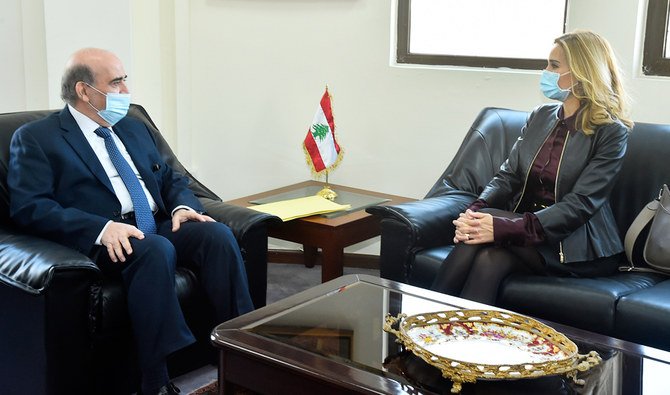Najia Houssari
BEIRUT: Lebanon’s foreign minister, Charbel Wehbe, demanded the absolute secrecy of the investigation into “suspicions of money laundering and embezzlement by the Banque du Liban,” following a Swiss request for assistance from the Lebanese judiciary.
Wehbe met with the Swiss ambassador to Beirut, Monika Schmutz Kirgoz, on Monday, who refused to comment on the matter, saying that the probe was a matter that the Swiss minister of justice and the attorney general were dealing with, adding that the Swiss attorney general was the one who requested judicial assistance.
Wehbe said: “Despite the importance of this matter to the Lebanese public, absolute secrecy is required in response to what is being circulated through Lebanese media regarding this case.”
Wehbe called on the media to “report the news as it is, without interpretations, additions, or switching words around.”
He also said: “I hope that the Lebanese judiciary will have absolute freedom to make a statement and take the appropriate decision in this regard.”
The Lebanese judiciary informed the governor of the Banque du Liban, Riad Salameh, last week that he is expected to present his testimony either before the attorney general in Switzerland or before a Swiss judicial delegation at the country’s embassy in Lebanon.
Salameh denied he had made any transfers from the accounts of the Banque du Liban or from its budgets, and expressed his readiness to go to Switzerland to present his testimony.
He said in a statement on Monday: “All reports about large transfers reported by some media outlets are very exaggerated and have nothing to do with reality. They aim to systematically tarnish the image of the central bank and its governor.”
Salameh refused in his statement to “publicly delve into figures and facts to refute all the lies.”
A Lebanese judicial source told Arab News: “(The Lebanese judiciary) has nothing to do with the Swiss investigation into the case of the Banque du Liban. We received a request for assistance, and we are acting as a mailbox.
“The Swiss asked for documents, and we have referred the request to the central bank, and when the documents are available, we will forward them to the Swiss judicial authority.”
The Swiss parliament approved in late 2019 the automatic exchange of bank data with 18 additional countries, including Lebanon.
This agreement means that Switzerland can, under the agreement, provide details of bank accounts held by Lebanese citizens for the purposes of tax verification.
The implementation of this agreement began this year, but Lebanon will not benefit from it due to its failure to meet the standards of the Global Privacy Assembly, according to the declaration issued by the Swiss parliament at the time.
This means that Lebanon will not be able to obtain data or information on Lebanese accounts in Swiss banks, nor in the banks of the signatory countries, except in one case: If the Swiss authorities prove that the transferred funds are suspicious.
News was circulated on social media on Sunday that a Swiss member of parliament said there had been a Swiss decision to freeze Lebanese accounts due to large suspicious financial transfers.
Swiss Socialist MP Fabian Molina said that the funds that arrived in his country from Lebanon after 2016 increased by about $2 billion, “but it has not yet been confirmed that the money entered Switzerland from illegal sources.”
Molina did not confirm reports that funds in Salameh’s account had been frozen. “The press was the one that reported freezing $400 million in Riad Salameh’s account,” he said.
The forensic audit into the accounts of the Banque du Liban is one of the most important clauses in the economic recovery plan that was approved by the government to negotiate with the International Monetary Fund. This clause was included in the French initiative set by President Emmanuel Macron to help Lebanon solve its economic crisis.
Free Patriotic Movement MP Salim Aoun accused “a political system of transferring billions of dollars abroad.”
He said: “Salameh is the agent of this system. If protection for the first official is removed, protection will be removed for all officials, and I fear that some will interfere to obstruct this path.”






















